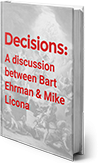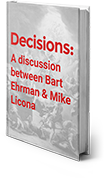Who Made God?
It was bedtime and the little child rested her head on her daddy’s lap. “Who made the world and the sun and the moon and the stars, Daddy?” “God made them, Sweety.” Pausing for a moment to absorb the idea of a Creator the little girl asked innocently, “Daddy, who made God?”
We have all either asked the question or have been asked it: Who Made God? Everything we know of has a beginning and was caused to exist by something else. Everyone reading this article began to exist and was caused to exist by their parents.
But what about God? Who caused Him to exist and when?
When it comes to God, such a Being would be without a beginning. But how can this be? While such may be a difficult concept to grasp, something eternal and without a beginning is actually required by logic.
The very first thing to exist must have had a beginning or it is eternal. If it had a beginning, then only three options are available: it began uncaused (since it was the first thing to exist there would be nothing else preceding it which could have caused it), it caused it’s own existence, it was caused to exist by something else. However, all three of these options are unpalatable.
If the first thing to exist began uncaused, then it just came into being out of nothing (since it was the first thing to exist) without being caused. In light of what we do know both historically and experientially, this is impossible. The old Latin dictum applies: “ex nihilo, nihil fit” (“out of nothing, nothing comes”). The second option, that it was self-caused is likewise impossible, since the first thing to exist would have had to precede its own existence in order to cause it. The third option, that it was caused to exist by something else is also impossible, since we are referring to the “first” thing to exist. If this “first” thing was caused to exist by something else, then it was not the “first” thing. Therefore, we are left with the inescapable conclusion that the first thing to exist is eternal.
What was the “first thing to exist?” Theologians, philosophers, and scientists have theories, but none can be proven with absolute certainty. It does not appear that the universe was that first thing, since scientists unanimously agree that at some point in the distant past, the universe had a beginning. This is because all of the data indicates that a “Big Bang” occurred at which time the universe sprang into existence. In order to escape the conclusion that the universe began to exist, in the past some scientists postulated a model of the universe involving an infinite number of Big-Bangs.(1) However, this theory, while abandoned by most many years earlier, was decisively refuted in 1998. Five teams of astronomers from Yale, the Lawrence Berkeley National Laboratory, the Harvard-Smithsonian Astrophysics Institute, and two teams from Princeton, all using different techniques, arrived at the common conclusion that the Big-Bang was a single event and will not be followed by a “Big-Crunch.”(2)
Others have postulated that there have been an endless succession of caused events. For example, Mormons believe that God is the cause of humans on Earth. Being finite Himself, He was ultimately caused to exist by another God, who was caused to exist by another God, ad infinitum. However, this is implausible. Suppose I have a photocopy of a photocopy of a photocopy . . . (ad infinitum) of a dictionary. I cannot have an infinite number of successive copies without an original. As Christian philosopher, David Beck explains, when you see a long freight train moving along flat ground, you know that there is an engine somewhere pulling it even though you may not be able to see it. This is because, although one boxcar is pulling the one that follows, there must be a final car, an engine, that initiates the pulling.(3)
Some attempt to use quantum theory in order to explain away a beginning of the universe. However, although such theories are dressed with impressive scientific jargon, even major proponents concede that “such ideas are speculation squared.”(4) A theory, in itself, is not evidence.
What about God? Could God be the “first thing to exist?” The Christian view is that He is.
“Before the mountains were born, or Thou didst give birth to the earth and the world, even from everlasting to everlasting, Thou art God.” (Psalm 90:2, NASB)
“Now to the King eternal, immortal, invisible, the only God, be honor and glory forever and ever. Amen.” (1 Timothy 1:17, NASB)
“Just because the Bible says it, does not make it so,” says the skeptic. This is where one’s worldview begins to play an important role. The atheist can only wait and hope that a naturalistic explanation will someday surface. One the other hand, the theist (i. e., one who believes that God exists) observes that there must be a first Cause in the universe, a cause that is eternal out of logical necessity. If it is true that space and time first came about with the Big-Bang, then the first Cause must itself be spaceless (i.e., immaterial) and timeless. Moreover, the universe appears to have been finely tuned with life in mind, indicating an intelligent Designer. So we find that the universe has an ultimate Cause that is itself an eternal, immaterial, and intelligent Being.
Does this prove the Christian God? No. But the evidence certainly fits nicely with the Christian view of reality. In fact, when one later considers additional evidence, one finds that the Christian view provides the most plausible and unified theory of reality; a theory you can bet your life and soul on.





